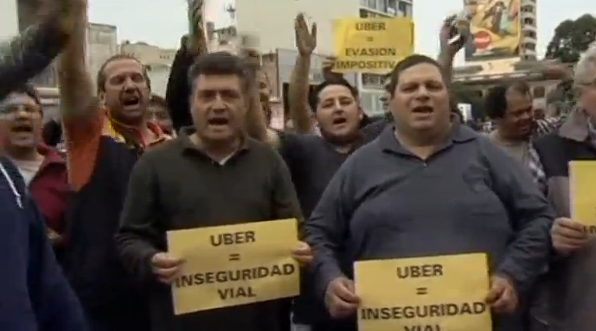
BUENOS AIRES, Argentina (Reuters) – As Uber launched its service in Argentina on Tuesday (April 12), taxi drivers choked downtown Buenos Aires traffic to protest the service.
The private car company, which is not yet regulated in Buenos Aires, claims to have thousands of drivers on the streets of the South American capital.
It launched its service by offering users two free trips, as long as each trip was below 100 pesos (USD 5.73).
Taxi drivers brought the streets to a standstill as they lined up their vehicles at over a dozen street corners.
One Argentine man said he has been a chauffeur for almost two decades and is concerned that he will be left without work.
“The truth is that I’m worried. I have been a taxi driver for 18 years because I lost my employment in the 90s under (former President Carlos) Menem. I don’t want my source of work and that of my mates to be affected again. I don’t want to go back to that time because I get the feeling that with all these measures, it is a free-for-all: anyone can do what they want. Anyone can take a 2009 car and go out and work the same as us,” he said.
The taxi driver said he has made a sizable investment to be properly licensed and feels he is now being unfairly targeted by people who have not undergone the same scrutiny.
“We go to a lot of trouble to maintain this activity (drive the taxis). We take annual courses on top of renewing our licenses through the exams that the professional passenger transportation registry makes us take,” he said.
Early on Tuesday, the taxi union filed an injunction to try and stop Uber from launching its service.
Buenos Aires Transportation Secretary Juan José Méndez said on local media that Uber vehicles have not been authorized to operate in the city and risk being towed.
Uber representatives have said on local media that they operate legally.
San Francisco-based Uber, whose investors include Goldman Sachs and Google, has grown rapidly around the world but has faced protests, bans and restrictions in several cities.







